#Poor People's Campaign
Text
3 notes
·
View notes
Text
Yo my friends at the Texas Poor People's Campaign are hosting a talk RIGHT NOW about Greg Abbott m and the bullshit he's doing at the border. Yes it's on Facebook, yes you can deal for an hour or 2. Watch it. Share it around. People need to know what's happening and how to help.
https://fb.watch/pXC1wXgux4/
#texas border#texas border crisis#greg abbott#fuck greg abbott#poor people's campaign#texas poor people's campaign#livestream#immigration#immigrants#illegal immigration
3 notes
·
View notes
Photo
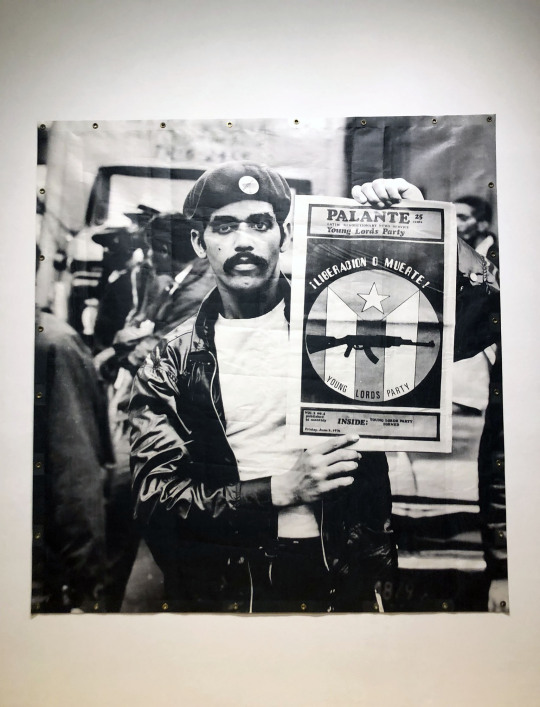
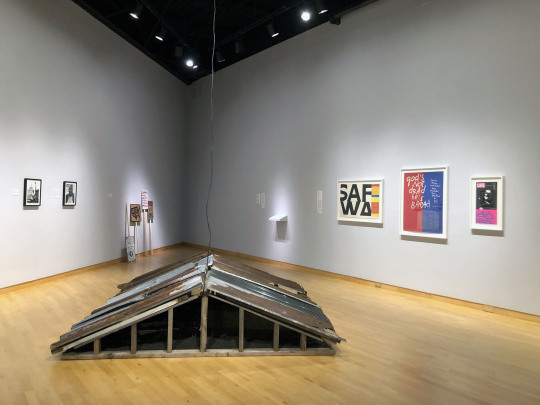
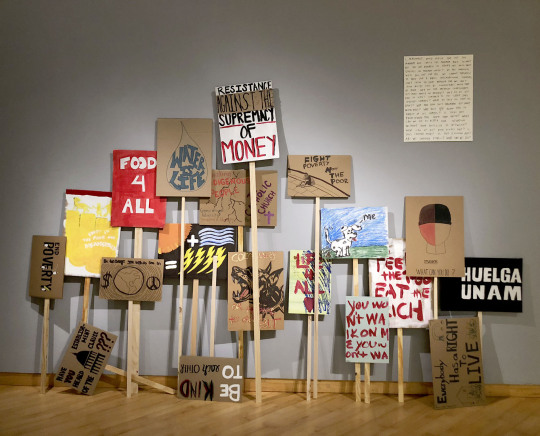
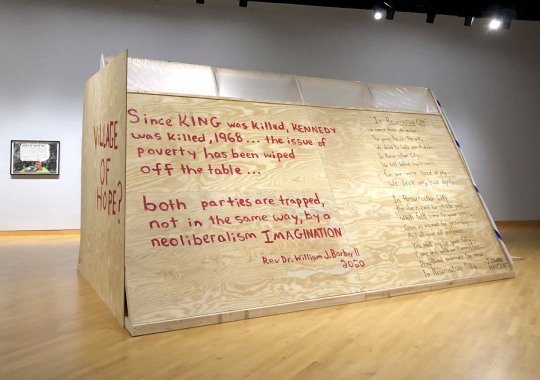

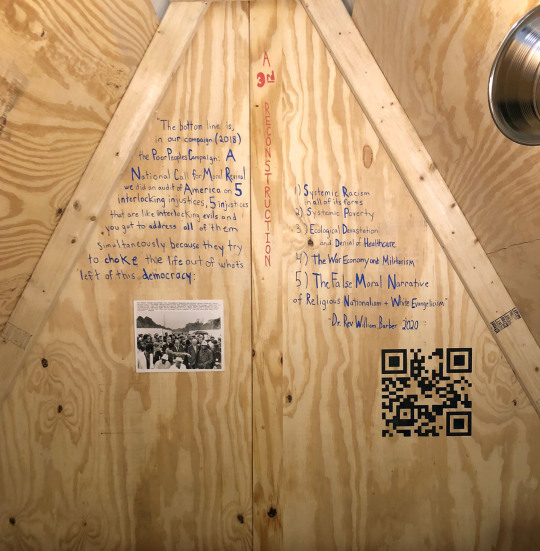
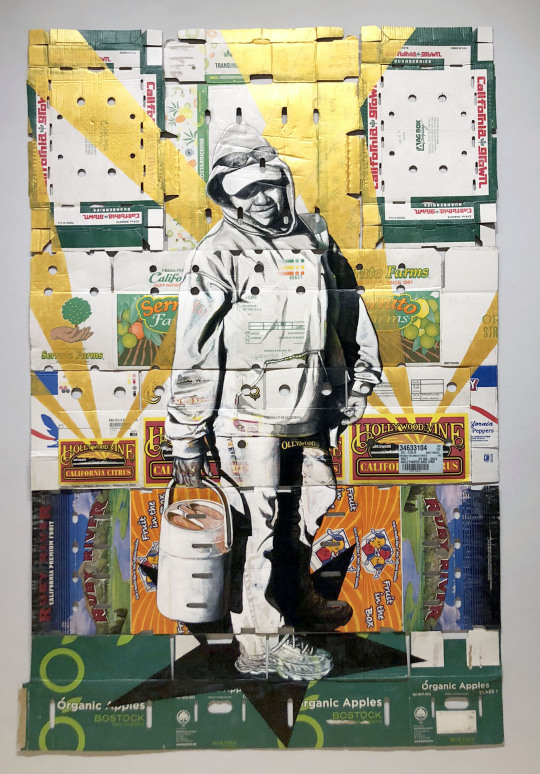


Poor People’s Art: A (Short) Visual History of Poverty in the United States at USF Contemporary Art Museum in Tampa uses installations and artworks to tell the story of, and expand perspectives on, The Poor People’s Campaign- from its origins in the late 1960s to the present day form, as well as comment on poverty and other social issues. Both educational and engaging, it shows that despite long struggles and some progress, we are still very far from much needed social change, especially in regards to poverty.
The museum also produced a free full color, 48 page workbook that you can pick up there or download as a PDF that can be downloaded from their website.
From the gallery’s website-
Dr. Martin Luther King Jr. is well known for his “I Have a Dream” speech, yet much less emphasis is placed on his campaign to seek justice for America’s poor, “The Poor People’s Campaign.” This was a multi-cultural, multi-faith, multi-racial movement aimed at uniting poor people and their allies to demand an end to poverty and inequality. Fifty-three years after Dr. King’s death, the Reverend William Barber II launched a contemporary push to fulfill MLK’s ambitious brief — one that calls for a “revolution of values” that unites poor and impacted communities across the country. The exhibition Poor People’s Art: A (Short) Visual History of Poverty in the United States represents a visual response to Dr. King’s “last great dream” as well as Reverend Barber’s recent “National Call for Moral Revival.”
With artworks spanning more than 50 years, the exhibition is divided into two parts: Resurrection (1968-1994) and Revival (1995-2022). Resurrection includes photographs, paintings, prints, videos, sculptures, books, and ephemera made by a radically inclusive company of American artists, from Jill Freedman’s photographs of Resurrection City, the tent enclave that King’s followers erected on the National Mall in 1968, to John Ahearns’ plaster cast sculpture Luis Fuentes, South Bronx (1979). Revival offers contemporary engagement across a range of approaches, materials, and points of view. Conceived in a declared opposition to poverty, racism, militarism, environmental destruction, health inequities, and other interlocking injustices, this exhibition shows how artists in the US have visualized poverty and its myriad knock-on effects since 1968. Participating artists include John Ahearn, Nina Berman, Martha De la Cruz, Jill Freedman, Rico Gatson, Mark Thomas Gibson, Corita Kent, Jason Lazarus, Miguel Luciano, Hiram Maristany, Narsiso Martinez, Adrian Piper, Robert Rauschenberg, Rodrigo Valenzuela, William Villalongo & Shraddha Ramani, and Marie Watt.
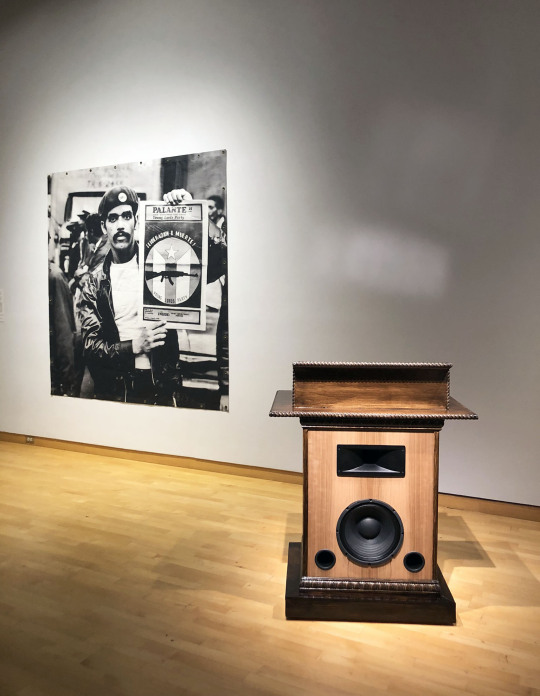
From the museum’s wall plaque about the images from the artists above-
A multimedia visual artist whose work explores themes of history, popular culture, and social justice, Miguel Luciano revisits the history of the Young Lords, a revolutionary group of young Puerto Rican activists who organized for social justice in their communities beginning in the late 1960s. Luciano’s first contribution to Poor People’s Art is a vinyl banner from the public art project Mapping Resistance: The Young Lords in El Barrio (2019), a collaboration with artist Hiram Maristany. It features the photograph “Young Lords Member with Pa’lante Newspaper (1970)” by Maristany, who was the official photographer of the Young Lords and a founding member of the New York chapter. This banner, along with nine other enlarged Maristany photographs, were installed throughout East Harlem at the same locations where their history occurred 50 years prior.
Luciano’s second contribution to Poor People’s Art is the sculpture The People’s Pulpit (2022), a repurposed vintage pulpit from the First Spanish Methodist Church in East Harlem. The Young Lords famously took over the church in 1969 and renamed it “The People’s Church”; they hosted free breakfast programs, clothing drives, health screenings, and other community services there. In this exhibition, The People’s Pulpit features an historic recording of Nuyorican poet Pedro Pietri reciting the celebrated poem Puerto Rican Obituary during the Young Lord’s takeover of The People’s Church.
The central sculpture in the second photo-
Afro-Taino artist Martha De la Cruz fashioned her sculptural installation Techo de sin (Roof of Without), 2021, from stolen, scavenged and donated materials found in Southwest Florida. According to the artist, “Florida is home to a large population of Latin American migrants who have ended up in the US largely due to economic pressures, exploitation and veins of power etched by Europe and the US.” Her powerful work deals with the results of this disjunction and the “symptoms thereabouts (e.g. houselessness, fugitiv-ity, government corruption, and income disparity, etc.).” According to De la Cruz, the word “sin” is a common Dominican mispronunciation for the word “zinc.” The sculpture is animated by a single light bulb that turns on for just ten minutes a day.
From the wall plaque about the Lazarus installation (structure in the 3th, 5th and 6th photos)-
Jason Lazarus’s sculptural installation Resurrection City/Poor People’s Campaign: A National call for Moral Revival/A Third Reconstruction (2023) is anchored in the artist’s historical research and several key photographs of Resurrection City. A tent-like shelter inspired by the temporary residences that populated the 1968 mass protest, the interactive sculpture contains simple sleeping quarters and a curated library filled with physical literature and ephemera centered on both the 1968 Poor People’s Campaign and the 2018 Poor People’s Campaign: A National Call for Moral Revival, co-led by Rev. Dr.William Barber and Rev. Dr. Liz Theoharis.
The library allows for audiences to trace, listen, and talk about the history of advocating for the poor, from 1865 to the present. Additionally, the artist provides a custom transcription (and a QR hyperlink) to Barber’s 49-minute address on the syndicated radio show “The Breakfast Club” in which he carefully outlines his powerful vision for how we might address poverty going forward.

About Jill Freedman’s photograph above-
In the spring of 1968, the talented young street photographer Jill Freedman quit her day job as a copywriter in New York City to join the Poor People’s March on Washington. Freedman lived in Resurrection City for the entire six weeks of the encampment’s existence, photographing its residents as they rallied, made speeches, protested in front of government buildings, confronted police, built makeshift kitchens, organized clothing swaps, and dealt with flooding, petty crime, and illness. One of the most important postwar documentarians, and one of the few women photographers of the era, Freedman captured it all. Freedman’s 2017 book, Resurrection City, 1968-from which this exhibition draws a dozen powerful images-showcases the photographs that she made as a participant in the original Poor People’s Campaign. In multiple ways, Freedman’s images are the sympathetic perch upon much of which much of the present exhibition loosely hangs.
This exhibition closes 3/4/23.
#usf contemporary art museum#tampa art shows#poor people's campaign#poor people's art#miguel luciano#hiram maristany#martha de la cruz#jill freedman#narsiso martinez#jason lazarus#art installation#social issues#art#art shows#poverty#mark thomas gibson#rico gatson#florida art shows#photography#sculpture#drawing
14 notes
·
View notes
Text
March 2, 2024 -- Save the Date!
A DAY OF NATIONALLY-COORDINATED, SIMULTANEOUS DIRECT ACTION ALL ACROSS THE COUNTRY.
GATHER AT 10AM, MARCH AT 11AM
This is happening in every state (not just in Raleigh) - be loud and proud, and bring a friend.
Learn more HERE
#poor people's campaign#us politics#poverty is a policy choice#2 MARCH 2024#get involved#moral March on your state capitol
0 notes
Text
“Changing the Narrative” based on Deuteronomy 15:1-4 and Matthew 26:1-16
I grew up in the country, and went to college in rural New Hampshire, so when I started interning as a pastor in urban Los Angeles, …. well, there was a big learning curve. I was scared of cities, because they were just new to me, and I found them overwhelming. Los Angeles is a major urban center, and like most of our urban centers it has dazzling wealth and heartbreaking poverty. Homelessness is an especially huge problem in Los Angeles because people spend their live savings to get there expecting to “make it big” by walking down the street and having a producer hire them for a major movie. Also, it isn't cold there, so there aren't networks of code blue shelters.
I worked at a wonderful church, the Hollywood United Methodist Church, and in ways similar to here, the congregation itself was a mixture of the housed and the unhoused, and no conversation about the church happened without awareness of their unhoused neighbors. One of the most distressing moments of my life was in getting to know the unhoused in the Hollywood Church and those who lived around it, and realizing that many of them were the same population as the people I cared for at Sky Lake Special Needs camps. That the most vulnerable among us were living the hardest lives is a lesson I've never gotten over. While I served there we would also go to Skid Row – the poorest part of Los Angeles - and serve meals, an experience that wiped any lingering blinders I had about the justice of unfettered competitive capitalism.
After my first year interning at Hollywood, I went on a mission trip to Cuba with Volunteers in Mission. We started in Havana, and eventually drove east to the site where we would work. After several days on the road I finally realized that I was tense all the time because it constantly felt like we were about to slip into a neighborhood like Skid Row, and I expected the punch to the stomach that I'd experienced in seeing Skid Row. But, in Cuba, everything felt like the neighborhood before you got to jaw-dropping poverty. But you never got to jaw-dropping poverty. This was 2004, and I've since learned that in the early years after the US embargo there really wasn't enough enough food, but by 2004 the island had figured out how to feed and house everyone sufficiently – even though cement crumbled and drug stores were largely bare.
There wasn't much panhandling in Cuba either. There was a little bit, in tourist spots, but our hosts pointed out that because everyone is housed and fed in Cuba, the panhandling was for extra money, not for for basics. I ended up going back to Cuba a few years later, and had very similar experiences. Like the metaphors of a fish being unable to understand water, it took leaving unfettered competitive capitalism for me to be able to see it.
This week I had the chance to attend a conversation led by the Labor and Religion Coalition on the New York State Budget. Many of us are familiar with the Federal Poverty Line, right? And we're also familiar with it's limitations, namely that it is abysmally low and a person or family living above that line will still be struggling to make ends meet. You may already know about the United Way measure “ALICE (Asset Limited, Income Constrained, Employed)”, but I didn't. (Can't tell you if I hadn't heard it or hadn't retained it though. Shrug.)
ALICE is a measure of who isn't making ends meet in society. Fabulously, United Way does an amazing amount of work with the data on Alice. For instance, in NYS 14% of people live under the poverty line. Another 30% of people are in ALICE, and 56% of people are “doing OK” and making ends meet. The numbers a bit worse in Schenectady – in our city 49.8 people live below the ALICE threshold, which is to say that HALF of the people in this city aren't making ends meet.
What was particularly interesting in the presentation this week was the visual on recent poverty rates.
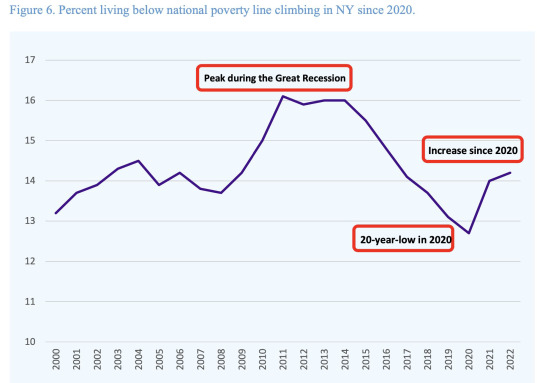
Namely, that during 2020, when the government focused on responding to people's needs with stimulus checks, child tax credits, and expansion of SNAP benefits, people living under the national poverty line hit a 20 year LOW.
And since then, the rates have been creeping back up. The work of the Labor and Religion Coalition and their partners The Poor People's campaign includes asking NYS to readjust it's priorities. Stop having regressive tax laws that benefit corporations and the wealthy, and use the income gained to bring greater support for the most vulnerable.
Compared to how we have been operating as a society, this feels like a PIPE DREAM. There so many barriers, so many counter arguments, so much fear of the accusation of “raising taxes.” But then I read the Bible, and I read it with the guidance of Rev. Dr. Liz Theoharis and Rev. Dr. William Barber, and God is behind that pipe dream.
Which, for me at least, means it is possible.
Which means we can dream about what it would feel like to live in a society where everyone is housed, and housed adequately. Archaeology suggests that in the first 400 years of Ancient Israelite society – the years before kings – all the houses were about the same size. Which means that society was organized around mutual care for each other and sharing of resources. I've been shocked to learn from the book “The Dawn of Everything” by David Graeber and David Wengrow that MANY ancient societies were really egalitarian like that, including ones with major urban centers, including ones that were stable for many centuries. The ancient Hebrews weren't an outlier.
The Hebrew Bible, though, gets really clear on what is needed to create a society where people care for each other. Everyone needs access to resources – in their case land. Did you know that in Hawaii the native people divvied up the land like really narrow pieces of pie because they knew every group of people needed access to the resources of both the land and the sea? God has worked with peoples in so many times and places to take care of each other, and that means it is possible. Liz Theoharis sufficiently mentions the other rules, “forgiving debts, raising wages, outlawing slavery, and restructuring society around the needs of the poor.”1 That's what we hear in Deuteronomy today. That's what Jesus reflect on in the gospel.
I'm struck by her clear statement that “charity will not end poverty.” It reminds me of the Simone Weil quote, “It is only by the grace of God that the poor can forgive the rich the bread they feed them.” As long as we have a society that makes some people rich BY making other people poor we'll have lots and lots of opportunities for charity, but nothing will change.
Our work, I believe, is the work of “narrative takeover.” For us, it may take some time. There is a lot in this unfettered competitive capitalism that we've been trained not to see, or to think is necessary, or acceptable, and the work we're doing with “We Cry Justice” this year helps us reframe the narrative.
What IS the purpose of a society? If it is to fulfill “there will be no need among you,” then we know what direction to turn in, even it it will be a long journey to get there. It is funny, isn't it? That people know the quote “the poor you will always have with you” but they don't know that the implication of it is “as long as you fail to follow what God is asking of you.”
So I invite us to this dream. What would it be like to live in a society that houses people well, where everyone had enough nutritious food, where healthcare can accessed? Can you even dream it? What are the implications? I think life would be easier for teachers – because so many barriers to learning would be eliminated. If those who spend their lives fighting to make ends meet were able to focus there gifts elsewhere, what could they offer? We would be able to offer great care to those who are aging, those who are young, and those with special needs – none of which we're doing now. People fighting to survive might then have energy for art, music, gardening, and other wonderful things that would enrich their lives and the lives of those around them! I suspect mental health would increase, because the fundamental fear of falling through the safety net wouldn't keep people up at night, and because there would be less stress, and more time for people to connect with those they love. Lives would probably get longer, violence would decrease, ERs would be less crowded, I think there might even be less litter and faster scientific progress. OH, and just that quick reminder- studies say that housing everyone, and feeding everyone, and getting healthcare to everyone would COST US LESS AS A SOCIETY THAN HOW WE DO IT NOW.
Kinda makes you wonder who benefits from how we do it now, doesn't it?
OK, that's probably about as much fish trying to see the water as we can take for a day. But I'd love to hear from you what else WILL happen when we make God's dreams a reality.... let's keep on building that narrative for each other, until we can see the dream clearly and then see the ways we are most gifted at moving towards it. May there be no need among us. Amen
1Liz Theoharis “1: Is Ending Poverty Possible?” in We Cry Justice, ed. Liz Theoharis (Minneapolis: Broadleaf Books, 2021) used with permission.
Rev. Sara E. Baron
First United Methodist Church of Schenectady
603 State St. Schenectady, NY 12305
Pronouns: she/her/hers
http://fumcschenectady.org/
https://www.facebook.com/FUMCSchenectady
January 28, 2024
#thinking church#progressive christianity#fumc schenectady#first umc schenectady#schenectady#umc#sorry about the umc#rev sara e baron#Poor People's Campaign#Labor and Religion Coalition#Regressive Tax laws#No need among us
0 notes
Text

I believe this is why he was assassinated
0 notes
Video
youtube
(via MLK Quote On MLK Day)
Find more at DiabolicalRabbit.Com
0 notes
Text

Flower Empowered.
[First] Prev <–-> Next
#poorly drawn mdzs#mdzs#lan wangji#wei wuxian#lan wunian#The absolute chaos that ensued when Lan Wangji showed up...those girls went wild.#We have to give kudos to narration that takes the form of a bunch of suitor seeking ladies.#They were so loud about being here for the hotties and whispering gossip. You go girls.#Wei Wuxian most likely just picked up a already tossed flower to throw. Second hand flowers...are still flowers I suppose.#Can you imagine if LWJ had allergies? Poor lad.#Okay it's time for the real gritty discussion point. The one everyone is waiting for me to talk about:#So...from where we are in the timeline...what the hell is WWX supposed to be wearing?#I'm serious. Put all the fanart out of your brain for a moment.#We are post burial grounds and sunshot campaign so he's had his little goth moment reveal.#*BUT* he is still with the Jiang sect. And by proxy of this flashback talking about his disrespect - they never bring up his attire.#meaning he is likely in some kind of Jiang Purple.#Continuity wise it really feels like this scene should have been *before* the burial mounds.#I understand why it's post - we need to build up on the mystery of how he became the YLLZ.#But also his personality feels way more 'pre-burial mounds WWX'. I think this was probably a 'I don't want to kill my darling' scene.#(The Phoenix mountain flashback is a lot of people's 'darling'. I am knowingly putting myself in the line of fire here).#I'm willingly putting him in Wen Qing's borrowed cloak and assuming people take him wearing it as like...a war trophy.#Historians will revise this moment later on but for now he *is* a hero of that war.
1K notes
·
View notes
Text
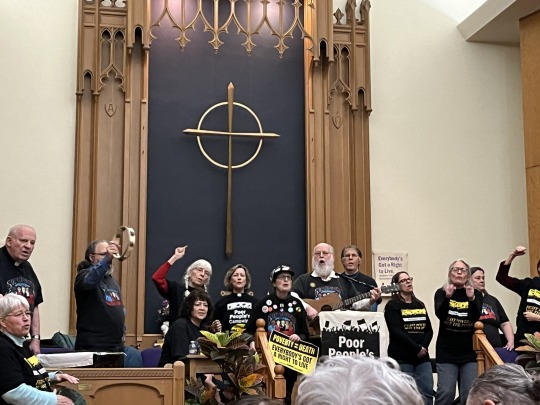
Today we’re committing to a moral revival with the Poor People’s Campaign in New Jersey. Many thanks to Turning Point Methodist Church in Trenton for hosting. We demand a living wage, affordable housing, health care for all, environmental justice, and just immigration policy. Forward together, not one step back!
29 notes
·
View notes
Text
if you feel guilty about something you love because it contributes to capitalism:
don’t.
capitalism needs you to be tired. it needs you to be so exhausted that you can barely think of anything outside of work, so that you can’t imagine how things could be better.
if you do things you love, you keep that energy for yourself. that’s energy you can turn outwards. that’s energy you can use to grow and help others and be human.
obviously we wanna harm reduce. obviously in an ideal world, that thing you love has zero negative impact. but you can’t work towards that world if you aren’t working on liberating yourself first.
#clearly there’s limits#like if your hobby is drilling for oil or exploiting poor people this post does not apply#but i find myself beating myself up for relatively the tiniest things#if i abstain from a takeout coffee i use one less plastic cup#but if i allow myself that coffee im in a better state of mind to campaign against plastic production#you feel me?#leftism#environmentalism#affirmation#activism#eco anxiety
65 notes
·
View notes
Text
Ayo you know about the situation in Texas? On the border with Mexico? Yeah it's only gotten worse!
From razor wire over the rivers to the downright horrors of the detention camps and the brutality of ICE, people are being treated like pests and vermin simply because they're fleeing violence and horrors from their home countries.
It's nothing but inhumane and deplorable what's going on down the border, and a great deal of it is perpetuated and enabled by our asshole governor, Greg Abbott. The man has proved time and time again that he's a proto-fascist fucknugget who sympathizes with Nazis and has backed and will continue to back the most oppressive, anti-human policies his lackeys in the legislature can come up with.
If you're within a couple hours of Austin, please consider showing up to our protest tomorrow against Greg Abbott's crimes against humanity!

If you can't, please support the shown organizations however you can, and share this wherever you can.
Fuck Greg Abbott, have a wonderful day <3
4 notes
·
View notes
Text
By Brett Wilkins
Common Dreams
Feb. 5, 2024
"Forty-seven percent of the voters are poor or low-wage," said one activist. "Getting that vote in is very important."
The Poor People's Campaign on Monday launched a 42-week nationwide mobilization of poor and low-income Americans to "wake the sleeping giant" of a voting bloc with the potential to determine the outcome of the 2024 elections.
"It is time for a resurrection and not an insurrection," Poor People's Campaign co-chair Rev. Dr. William Barber II said during a press conference in Washington, D.C. "We must engage poor and low-wealth people to change the political landscape."
"For far too long extremists have blamed poor people and low-wage people for their plight, while moderates too often have ignored poor people, appealing instead to the so-called middle class," he continued. "Meanwhile, poor and low-income people have become nearly half of this country and we are here today to make one thing clear: Poor and low-wage brothers and sisters have the power to determine and decide the 2024 elections and elections beyond."
"Economic justice and saving this democracy are deeply connected."
Poor People's Campaign co-chair Rev. Dr. Liz Theoharis stressed that "economic justice and saving this democracy are deeply connected."
"In this rich nation that has the wherewithal to end poverty tomorrow where there's the political will, we must not overlook the voices and votes of poor and low-income people," she added. "We are mobilizing and organizing, registering and educating people for a movement that votes... for healthcare and debt cancellation. Votes for living wages and strong anti-poverty programs. Votes for fair taxes and demilitarization of our communities and our world. Votes for immigrant rights and more."
Democratic pollster Celinda Lake said at the press conference: "In 2024, the election is going to be about mobilization... Democrats have an enthusiasm gap today and the progressive alliance and Democrats have fissures within their constituencies that make getting out the vote even more important."
"The biggest bloc of potential voters by far is low-income, low-wage voters," Lake noted. "Where the margin of victory is projected to be less than 3% in 2024, 30-45% of the voters are low-wage voters or low-income families... The turnout among low-wage voters and low-income voters today is... 20-22% below the average turnout. This is a huge bloc of voters, and it is a bloc of voters that votes 58-60%—at minimum—progressive, no matter how conservative the state."
"You're talking about a huge number—a game-changing number—of voters," she added.
The campaign's main scheduled events are a Mass Poor People's & Low-Wage Workers' Moral March to State House Assemblies on March 2 and a rally and march in Washington, D.C. on June 15.
"I have been struggling to pay my bills since I've been working at 16 years old. I work full time, 64 hours a week, seven days a week," said Beth Schafer of Raise Up for $15 during a video promoting the new campaign. "I am exhausted."
Crow Roberts, an organizer with the Indiana Poor People's Campaign, said in the video that "our government finds it necessary to ban abortion to say that they are saving our children, but more children die as a result of poverty in this country."
Guadalupe de la Cruz of the Florida Poor People's Campaign asserted that "we should not be cornered and forced to choose between one necessity or another."
Speaking at the press conference, Alabama activist Linda Burns said that "for three years I worked the assembly line at Amazon in Bessemer, Alabama. The work was grueling. We were expected to work like robots, moving like 1,000 pieces per hour."
"I got badly injured. My left arm," she continued. "I had two surgeries. I had to get a third surgery, but I didn't have no more insurance. Amazon, they cut my insurance off a year after. They let me go last October."
"Amazon let me go because I was helping organize the union," said Burns. "We didn't get the union in Alabama but I'm gonna do everything in my power to stand in solidarity. Organizing the union showed me just how many people were in the same situation I was. Not just in Alabama, but all over the world."
"Forty-seven percent of the voters are poor or low-wage. Getting that vote in is very important," she added. "We cannot settle for less, we've got to stand up for our rights. We are forward together—not one step back."
18 notes
·
View notes
Text
youtube
Rev. Dr. William Barber - “White Poverty” & Poor People’s Campaign March | The Daily Show
#Rev. Dr. William Barber#Poor People’s Campaign March#The Daily Show#Poverty#jon stewart#White Poverty: How Exposing Myths About Race and Class Can Reconstruct American Democracy#Youtube
2 notes
·
View notes
Text
youtube
Bishop Barber Speaks at the City-Wide Juneteenth Worship Celebration in Houston, TX
"God Gave Us the Spirit to Stand Up and Fight!" is the message from Bishop William J. Barber, II as he is is the guest proclaimer at the city-wide Juneteenth Worship Celebration" at The Community of Faith Church in Houston, TX.
2 notes
·
View notes
Text
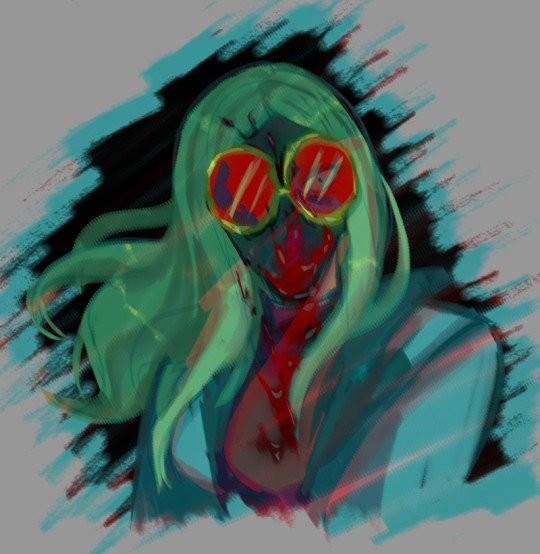
Mama, they say I'm a terrorist
#ooooooo zoya lore doodle ooooooo#digital#darcy's ocs#zoya petrov#she wants people to be safe and healthy and the dictator and his dr were keeping the people sick and in debt so he could have more 'food'#she was labeled a traitor for trying to kill the dictator of her country for using the poor as food to keep himself alive#zoya was a doctor that was brought in to apprentice under the dictator's personal doctor and she learned what they were doing#she wanted to put an end to it because she became a dr to help others not harm#she tried to assasinate the dictator and was caught and defamed and imprisoned for 6 years before escaping#shes on the run now and helps sick or wounded people in need for free but does merc work for commission#her goal is to return home and finish the job and take down the dictator and free her country#oh yeah the dictator is also undead and eats his people to keep 'alive' and sentient#i need to play her so bad she's for d&d but alas.... no campaign#anyway errrm sorry for the loredump in tags#blood cw#she helps people who are sick or injured for free bc she believes everyone has the right to healthy and happy lives regardless of anything#however she will fuck up a corrupt motherfucker without hesitation
6 notes
·
View notes